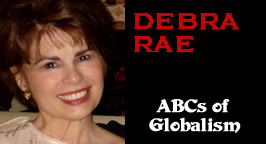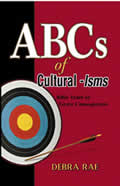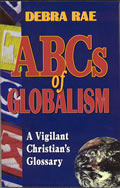A
GRAND DESIGN MADE TO ORDER
PART 1 of 3
By
Debra Rae
June 6, 2010
NewsWithViews.com
King of the Mountain
In our age of constant crisis, world citizens yearn for “global security,” peace, and harmony that transnational federal government alone is said to offer. But the one-world agenda is by no means new. Babylon, Medo-Persia, Greece, and Rome all gave it a whirl under the likes of Nimrod, Nebuchadnezzar, Alexander the Great, Julius Caesar, and Napoleon (among others).
Throughout history, each tyrant touted his own designer brand of global governance; each fell short of the prize. In less than a year, for example, Hitler and his henchmen effectively enslaved and dominated most of Europe, but in the end failed to accomplish the thousand-year Third Reich.
A presently emerging New World Order inspires endless speculation as to its source, nature, timeline, and ultimate fate. Though dubious conspiracy theories abound in the tradition of long-debunked Protocols of the Learned Elders of Zion, naysayers agree nonetheless that globalism defines twenty-first century reality. Activists call for local action on behalf of the global community.
While illuminists herald a planetary shift to a new age of elevated consciousness, and bio-regionalists advance the cause of “planethood,” internationalists labor to birth a Novus Ordo Seclorum (“New Secular World Order of the Ages”). The Bible prophesies yet another future world rule distinguished by an universal religion, economic dominance, and some sort of self-ruling republic known popularly as “democratic trans-nationalism” or globalism.
The true “Mother of all Dictators,” known as the Antichrist (one who stands against and in place of the Messiah), will assume its headship, but thankfully not for long. Once the time is up for this would-be “king of the mountain,” Christians anticipate (and can expect) a millennial rule and reign under Jesus Christ Himself. Theirs promises to be a theocratic world order reflective of the Garden of Eden.
In contrast, Wahabi Muslims seek one-world dominance under Shariah Islamic law. Osama bin Laden is a self-proclaimed adherent of Wahabism, representing a sort of revivalist mega-fundamentalism on steroids, if you will.[1]
Globalism by Definition
In brief, globalism is a collectivist, one-world state that supplants biblical belief with alleged enlightenment, pluralism, and world law. Globalists peddle their wares with undeliverable promise of an emerging egalitarian utopia that John Lennon himself could “only imagine.”
Cosmic citizens join dreamers, as Lennon, in visualizing a brotherhood of man living as one and therefore finding nothing to kill and die for (especially not religion).[2] Smitten by the bug of “political cosmopolitanism,” global citizens willingly pledge allegiance, not to their nation-state of origin or residence, but rather to the world community at large and the euphonious vision it represents.
In the name of justice, globalization speaks specifically to redistribution of the world’s wealth but, then, concentrates that wealth—and power—into the hands of few. Head honchos are strategically postured to manage the world’s huddled masses—all “yearning to breathe free,” but instead destined to burdensome constraints of international law.
At stake for all are national sovereignty (exchanged for “harmonization”), personal liberties (exchanged for Earth servitude), and freedom to self-govern (exchanged for global law).
Those destined to steer the movement are identified by some as the Eastern Liberal Establishment of Insiders. The Bible alludes to them as veritable “kings without kingdoms.”[3] Globalism’s proverbial brain resides within the elitist ranks of the Council on Foreign Relations (CFR), offshoots from which wield three arms of power—namely, economic, spiritual, and political. Change agents who “help make” foreign policy compatible with global goals are CFR media members undergirded by inner-circle academia.[4]
Order out of Chaos
In 1776 Grand Patriot of the Jacobin Society Adam Weishaupt founded the clandestine Order of the Illuminati. His Law of Fives was a dandy scheme to grasp control by fomenting crisis (whether natural or engineered) and, then, to offer a viable “fix.”
In implementing this Machiavellian agenda, any crisis suffices—environmental catastrophe, water shortages, genetically altered foods, new diseases, nuclear attack, terrorism, biological warfare, an imploding social system, a failing education system, even aliens from outer space if need be!
It goes like this: Introducing chaos spawns discord for which new laws are required. In the midst of confusion, a dictatorial figure conveniently emerges—first, to explain the problem; then, to micromanage it. Ensuing frustration and alienation induce many to escape into fantasy and addiction, and emotionally detached dupes are easier to control. The result? Order out of chaos—simple as that.[5]
The Grand Design of Islamists
By way of example, the Wahabist movement and chaos go hand-in-hand. Begun by an East Saudi Arabian Muslim scholar of the seventh century, the revivalist Wahabi movement is extremist in its orthodoxy and decidedly militant in action.
By uniting Muslim nations under the leadership of a Wahabist coalition, the faithful purpose to forcibly expel the West from the Middle East and, thus, “liberate” Palestine from America, the Great Satan, and the Lesser Satan Israel. Next, in order to elevate to the status of divine mandate both the spirituality and culture of seventh-century Arabia, Islamic Law must dwarf and eventually supplant the dominant biblical world order and ethic.
Forged by intimidation and, at times, violence, this Grand Design for world dominance lends itself handily to the Law of Fives. Accordingly, those committed to Weishaupt’s plan have lassoed this effort for their own opportunistic use. Once having served the one-world agenda, Wahabists eventually will be hog-tied and defanged by Weishaupt’s ilk; but for now their efforts create sufficient chaos to demand draconian control.
The Wahabi Goal
In short, the Wahabist’s goal is to establish a global community of all those who affirm Islam (an ummah). A successor to Muhammad’s temporal (not spiritual) authority (a single Caliph) is slated to govern the expected one-world theocracy.
To this end, a key strategy is “presence,” as understood by the so-called camel story: While on a journey, a camel convinces his master to allow his head to enter the warm tent in order for him to rest better. The master concedes and gradually allows the camel’s neck and two feet—finally, his entire body—to find refuge in the tent. Once having assumed full occupancy, the camel then evicts his master from out of what’s now become the camel’s tent.
Complete dominance is secured merely by entering, overcoming, and occupying a targeted place of refuge. With this strategy in mind, increasing numbers of elaborate, expensive mosques are being built all over the world—even if they remain unattended. By 2004, there were over 1,200 mosques and seven million Muslims in the United States alone; and (to borrow a phrase from Frazier) the camel has not left the building![6]
Jihad by Design
In a statement to the Senate Foreign Relations Committee in 1950, James Warburg (CFR) insisted: “We shall have world government, whether or not you like it, by conquest or consent.”[7] Muslim sentiments exactly.
By definition jihad is the word for struggle. The “greater jihad” refers to warfare against sin and contending for the faith; the “lesser jihad” references holy war by intimidation, threat and/or physical damage. The latter applies today.
Da’wah is a “call” or “invitation” to embrace Islam. Despite Muslim missions and physical presence, infidels may still refuse to bow the knee to Allah. In the absence of consent, conquest follows. For a reason, since 1983 four key Islamic nations (Iraq, Saudi Arabia, Libya, and Egypt) have been numbered among the nine largest purchasers of arms.[8] Communities of non-Muslims or unbelievers (dar-al-kuffer) fear terrorism—again, for a reason—and thereby can be coerced into the ranks of “the faithful.”
A Study in Fear
Moroccan scholar Fatema Mernissi explains the centrality of fear within Islam. Modern Muslims fear Allah and his Imams, the foreign West, democracy, freedom of thought, and individualism. They also fear the past, present, and future.
What’s not to fear? After all, the fire of Hell is said to be seventy degrees hotter than earthly fire; and escaping it depends on the whim of Allah. Unfortunately, Allah himself is by nature more relative than absolute. In fact, he is outright arbitrary with respect to salvation of his creation. In the words of Caesar Farah, “Allah may vary his ordinances at pleasure, prescribing one set of laws for the Jews, another for the Christians, and still another for Muslims.”[9]
| Subscribe to the NewsWithViews Daily News Alerts! |
Keep in mind, too, that Islam is a religion that labels one an apostate merely for turning pages of the Qur’an with licked fingers. (It follows that the late Colonel Sander’s chances of being greeted at the portal of heaven by seventy-two virgins were far from finger-licking good!)
Click here for part -----> 1, 2, 3,
Footnotes:
1,
Dr. William Wagner, How Islam Plans to Change the World (Grand
Rapids, MI: Kregel Publications, 2004), 36.
2,
John
Lennon Lyrics
3,
Revelation 17:12-13
4,
Tom Horn, How to Overcome the Most Frightening Issues You will Face
This Century (Crane, Missouri: Defender Books, 2009), 79-110
5,
Ted Flynn. Hope of the Wicked: The Master Plan to Rule the World
(Herndon, VA: MaxKol Communications, Inc., 2000), 256
6,
Wagner, How Islam Plans to Change the World, 39-59.
7,
Infamous
Quote from James Paul Warburg
8,
Fatema Mernissi, Islam and Democracy (Cambridge, Mass.”
Perseus, 2002), 44.
9,
Wagner, How Islam Plans to Change the World, 123
















